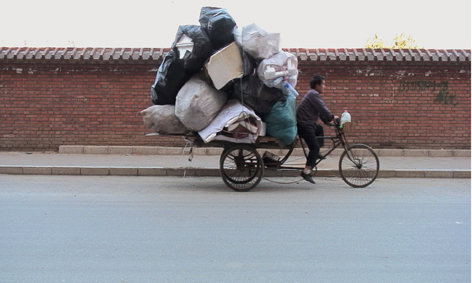Heike Baranowsky
dal 9/11/2006 al 21/12/2006
Segnalato da
9/11/2006
Heike Baranowsky
Galerie Barbara Weiss (old location), Berlin
The show includes new films and photogravures and a montage of images across a whole wall. Baranowsky visited China in 2005 and 2006. She made several films on life in China less through a narrative of the everyday, but rather by showing the everyday in its own deceptive way of suggesting objectivity.

T Square
For the fourth time Galerie Barbara Weiss is presenting a solo show by Heike
Baranowsky. This includes new films and photogravures and a montage of images across
a whole wall.
Heike Baranowsky visited China in 2005 and 2006. She made several films on life in
China less through a narrative of the everyday, but rather by showing the everyday
in its own deceptive way of suggesting objectivity.
The imprecise middle ground between alleged objectivity and voyeurism, which sets
free culturally tinged associations, frequently leads to a falsification of an
interpretation of a given situation. This is the case in the film "Interval" (2006),
in which a megaphone is seen on a chair in the open air and a loud litany of words
is heard in the language that is so foreign to Western ears. The listener may assume
that this is a case of propaganda or indoctrination, or the repeated chants at a
demonstration. This is a common interpretation, but it is fundamentally wrong, for
what we hear in this case is the menu of a nearby restaurant.
A narrative moment is produced on a secondary level through the soundtrack, which
frequently does not correlate with the image. This kind of sound collage creates an
inner world that withdraws from the reality of the image. Sound opens up a static
situation in which the space becomes visually restricted as if on a stage, as in
"CUE 1" (2006), a work that only superficially seems to raise questions about
staging or the quiet observation of a seemingly everyday scene. People are going
about their business; children are playing or posing for the camera. What is seen
from a fixed standpoint is alienated by the incongruity of the sound, indicating
something which has nothing to do with the situation in question - in this case it
is the sound of traditional musical instruments.
Heike Baranowsky captures situations in Chinese everyday life, as in her
sixteen-minute film projection "T Square" (2006), which she made together with
Waszem Khan. The film operates with a hardly perceptible and slow and regular zoom
in on Beijing's Tiananmen Square, where the evening ritual of lowering the state
flag is in progress. The transition from a city panorama to the action at this
historically and politically charged location is accompanied by a change in
atmosphere, both through the onset of darkness and a shift in perception from mere
viewing to observing.
The Western view of China is primarily determined by media reports about a country
negotiating Maoist restrictions and global openness, about a state with a remarkable
rate of economic growth, and not least images of the massacre on Tiananmen Square
now more than fifteen years ago. This is a Western view, which Heike Baranowsky
investigates and alienates through processes of manipulation. She demands a second
view, which breaks through both static observation and permanent motion, and thereby
distorts and expands accepted reception strategies of the visual.
Heike Baranowsky was born in 1966 in Augsburg. She lives and works in Berlin and
Bergen (Norway).
Opening: Friday, November 10, 7 - 9 pm
Galerie Barbara Weiss
Zimmerstrasse 88 - Berlin
Gallery hours: Tuesday - Saturday, 11 am - 6 pm



